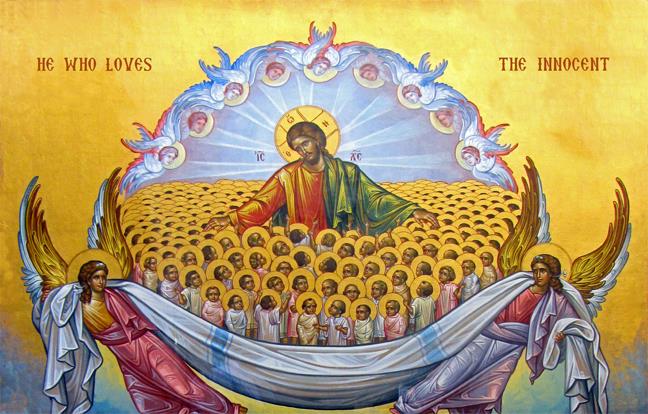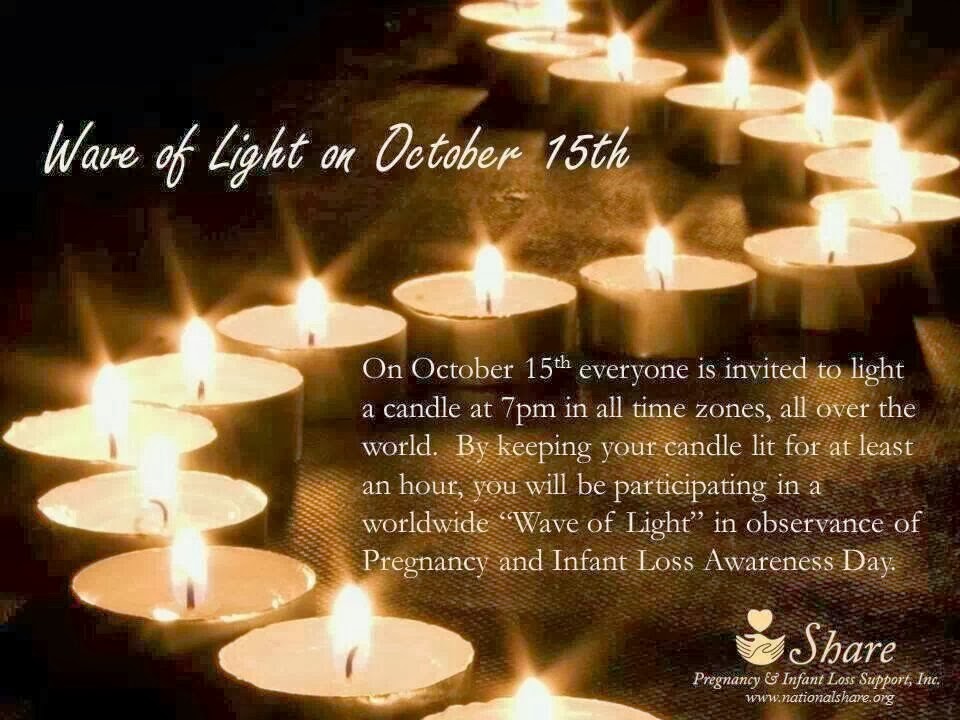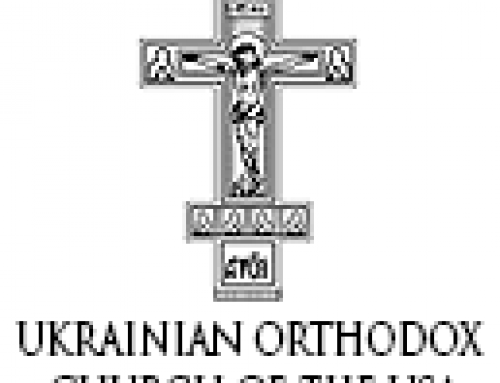This post was originally published on this site
In 1988, US President Ronald Reagan designated October as “Pregnancy and Infant Loss Awareness Month.” On September 28, 2006, the US House of Representatives designated October 15 as “Pregnancy and Infant Loss Awareness Day.”
In this updated article by Matushka Dennise Kraus, a wealth of information and ideas for observing Awareness Month and Day are offered. [The updated article also appears in the Parish Ministries Resources on the OCA web site.]
October: Pregnancy and Infant Loss Awareness Month
by Matushka Dennise Kraus

“Thy departure from this earthly life is a cause of grief and sorrow for your parents and all who love you, O little child; but in truth you have been saved by the Lord from sufferings and snares of many kinds. O Savior and Master of our life: comfort the faithful parents of this departed child with the knowledge that to innocent children, who have done no deeds worthy of tears, are granted the righteousness, peace and joy of Thy kingdom” [Canon Ode 9, The Service of Burial of an Infant].
Each year, approximately one million pregnancies in the United States end in miscarriage, stillbirth or the death of a newborn child. But this is not just a statistic. This is a life and a death issue.
It is my belief that both the Gospel and the Orthodox Church hold that life begins at conception — that is, the fertilization of the ovum by the sperm. God knows the name and age of each person from his or her mother’s womb, as we pray during the Liturgy of Saint Basil. We must therefore recognize that pregnancy loss — miscarriage, ectopic pregnancy or stillbirth — all result in the death of a human being, a baby, a “Child of God.” Parents who were anticipating life are now confronted with death. These deaths result in millions of parents and families grieving.
Grieving Alone

Archpriest John Breck, writing about the mother who has miscarried, states that “her pain needs to be acknowledged, accepted, and palliated through words and gestures of understanding, sympathy and love, offered by her family and the parish community.” In reality, most parents who experience the loss of a child during pregnancy, suffer alone. This is especially true in the instance of early pregnancy loss (i.e. miscarriages and ectopic pregnancies) where there is no “body” to be seen and often the mother shows no outward signs of pregnancy. Many people are unaware of the grief that pregnancy loss causes. Sometimes the grieving parents, themselves, reinforce the idea that they are not grieving, by pretending they do not experience hurt, as they try to “get on with their lives” and to “try again.”
It is important to note that not only is a parent’s grief over a pregnancy loss real and normal, it is also Christian. Too many times it is assumed that grief is not Christian—that the bereaved should accept the reality of the loss as being “God’s Will.” However, we know that when Jesus learned of the death of his friend Lazarus, “Jesus wept” [John 11:35]. Especially in early losses (most miscarriages occur before the twelfth week of pregnancy) people often use the clichés, “It’s God’s will,” “God wanted the baby in heaven for Himself,” “God knows best; the baby would have probably been deformed.” The only thing these sayings do is indicate to the parents that they should not mourn, that if they “are Christian” they will accept God’s Will and not “complain.”
National Observance of Pregnancy and Infant Loss Awareness
When in 1988 President Ronald Reagan proclaimed October as Pregnancy and Infant Loss Awareness Month throughout the United States, he noted that the day “offers us the opportunity to increase our understanding of the great tragedy involved in the deaths of unborn and newborn babies. It also enables us to consider how, as individuals and communities, we can meet the needs of bereaved parents and family members to work to prevent causes of these problems.” Subsequently, the resolution to declare October 15 Pregnancy and Infant Loss Remembrance Day passed the United States House of Representatives on September 28, 2006. In honor of Pregnancy and Infant Loss Remembrance Day, it is suggested by many bereavement groups that grieving parents light a candle at 7:00 p.m. in their respective time zones to create a wave of light around the world in memory of babies lost to pregnancy and infant loss.
At Holy Trinity Church, East Meadow, NY, we have been holding a Service of Prayer [Molieben] each year on October 15 beginning at 7:00 pm. A copy of the service can be found on the parish’s prayer ministry web site. Following the service, it is good to have fellowship and refreshments of some sort. It would also be a good idea to have pamphlets on grieving available. Pamphlets and resources can be found on the internet, but especially from the National Share Office.
Guidelines for Helping a Friend or Family Member to Grieve
Not everyone grieves in the same way. It is important to create a loving and understanding atmosphere to help those affected. Always work in cooperation with your pastor. In 2002, I wrote an article for our Diocesan Journal, Jacob’s Well, titled “Comforting Those Who Have Lost a Baby During Pregnancy or Shortly Thereafter.” I am including the guidelines from that article for people who may not know what to say or how to help a friend or family member who is grieving.
- The first—and likely the most important—thing you can do is realize that a baby has died and this death is just as “real” as the death of an older child. The parents’ grief and healing process will be painful and take time—lots of time. They may not be recovered or done “thinking about their baby” after a month or even a year. Realize that the parents are sad because they miss their baby, and that he or she can never be replaced by anyone else, including future children or children they may already have.
- Let the parents know that they, their family and the baby are in your prayers. Call or send a sympathy card. You don’t have to write a lot inside; a simple “You and your baby are in my thoughts and prayers” is enough.
- What the parents need most now is a good listener and a shoulder, not a lecture or advice. Listen when they talk about the death of their baby. Don’t be afraid, and try not to be uncomfortable when talking about the loss. Talk about the baby by name, if they have named the child. Ask what the baby looked like, if the parents saw the baby. Most parents need and want to talk about their baby, their hopes and dreams for their lost child.
- It is okay to admit that you don’t know how they feel. A good thing to say is, “I can’t imagine how you feel. I just wanted you to know that I am here for you and that I am very sorry.”
- Give a hug. This is a sign of love and concern. Even if this is all you do, it’s a nonverbal way of saying “I’m sorry” or that “I’m praying for you.”
- Offer to baby-sit their other children. Often there are follow-up doctor’s visits and the parents need a chance to be together as a couple as well.
- Offer to bring meals; often mothers have no energy to do even basic things.
- Offer to go food shopping, help clean the house, do laundry—anything that lightens the burden of daily chores that need to be done. This is especially helpful if the mother is still waiting to miscarry the baby. That process may take days and is physically and emotionally draining.
- Be careful not to forget the father of the baby. Men’s feelings are very often overlooked because they seem to cope more easily. The truth is that they are quite often just as devastated as their partner.
- Try to remember the anniversary of the death and due date with a card, call, or visit. Anniversaries can trigger grief reactions as strong as when the loss first happened. Months down the road a simple “How have you been doing since you lost your baby?” can give much comfort.
- Give special attention to the baby’s brothers and sisters. They too are hurt and confused and in need of attention which their parents may not be able to give at this time.
- If the children want to talk about the death, don’t be afraid to engage them in conversation. Children have a natural relationship to death and they are open and direct with adults with whom they feel comfortable. When children are allowed to share their dreams and thoughts openly, they are not usually impacted by death in a negative way.
- If you are pregnant, it may be hard for the bereaved parents (especially the mother) to see or even talk to you. You will need to be very understanding and extra patient with them. They still love you and are happy for you, but it is just such a huge reminder of what they have lost. Your bereaved friends may even feel a little jealous of you (especially after your baby comes), and then get angry with themselves for feeling that way.
- Remember that any subsequent pregnancies can be a roller-coaster ride of joy, fear and bittersweet memories.
- Remember also that mourning puts a tremendous strain on relationships between family and friends.
Your help, comfort, and sensitive support can be very influential in how the parents cope with the death of their baby and how they recover. You are important; they need you now more than ever.
After giving birth to two beautiful children, my husband and I experienced the deaths of two babies during pregnancy. Our second baby died while we were attending Saint Vladimir’s Seminary. The prayers and support that we received from the community aided in our healing. The Molieben that my husband serves on October 15 holds special meaning for us. We hope that such prayers will help others to heal as well.
“Blessed be the God and Father of our Lord Jesus Christ, the Father of mercies and God of all comfort, Who comforts us in all our affliction, so that we may be able to comfort those who are in any affliction, with the comfort with which we ourselves are comforted by God” [2 Corinthians 1:3-4].
Definitions
Grief—The thought and feeling experienced within oneself upon the death of someone loved. It is the internal meaning given to the experience of bereavement.
Mourning—The taking of the internal experience of grief and expressing it outside oneself.
Miscarriage—Death of an infant during the first 20 weeks of gestation. Usually a miscarriage occurs in the first 12 weeks. In most states the hospital is responsible for the remains of the baby. However, some states are introducing legislation that would allow parents to request the body for burial.
Ectopic Pregnancy—When the baby (fertilized egg) implants itself outside of the uterus. Medication or surgery is necessary to remove the conceptus (baby), prevent rupture of the fallopian tube, and to safeguard the mother’s life. A ruptured ectopic pregnancy is a potentially life-threatening event for the mother.
Stillbirth—The death of an infant in the last 20 weeks of gestation, but prior to birth. In most states it is the responsibility of the parents to bury the baby.
Neonatal Death—The death of an infant during the first 28 days after birth.
Perinatal Loss—The death of an infant during pregnancy, childbirth, or during the first 28 days after birth.
Helpful Websites
- Articles and prayer services for pregnancy loss.
- Helping those who have experienced the death of a baby due to early pregnancy loss, still birth, or during the first few months of life.
- A national self-help organization providing friendship, support and resources for parents and siblings grieving the loss of a child.
Helpful Resource
Bibliography
The Great Book of Needs, Expanded and Supplemented, Volume III. “The Order for the Burial of an Infant”. St. Tikhon’s Seminary Press. South Canaan, PA. 1999.
Borg, Susan and Lasker, Judith. When Pregnancy Fails: Families Coping with Miscarriage, Stillbirth and Infant Death. 1981. Revised 1989.
Breck, John. The Sacred Gift of Life. Orthodox Christianity and Bioethics. St. Vladimir’s Press. Crestwood, NY. 1998.
Elliott, Martha. An Orthodox Christian Response to the Death of a Child. SVS MA Thesis May, 1998 p9.
Klunger-Bell, Kim. Unspeakable Losses. Understanding the Experience of Pregnancy Loss, Miscarriage and Abortion. New York, London: WW Norton and Company, 1998.
Kohn, Ingrid and Perry-Lynn Moffitt. A Silent Sorrow: Pregnancy Loss: Guidance and Support for You and Your Family. New York: Routledge, 2000.
James, John and Frank Cherry, The Grief Recovery Handbook.
Limbo, Rana K. and Sara Rich Wheeler. When A Baby Dies: A Handbook for Healing and Helping. Bereavement Services. LaCrosse, Wisconsin. Revised Printing 1998.
Lothrop, Hannah. Help, Comfort and Hope After Losing Your Baby in Pregnancy or in the First Year. Fisher Books, 1992.
Moe, Thomas. Pastoral Care in Pregnancy Loss: A Ministry Long Needed. The Haworth Pastoral Press. New York. 1997.
Olson, Heidi B. When the Bough Breaks—Working with Families Who have Experienced The Death of an Infant (A Guide For Healthcare and Other Professionals).
Panuthos, Claudia and Catherine Romeo. Ended Beginnings. Massachusetts: Bergin & Garvey Publishers, Inc., 1984.
Shimchick, John. Sharing The Loss Of The Wished For Child. Parish Ministry Resources. Orthodox Church in America. New York. p. 5
Vogel, Gary E. A Caregiver’s Handbook to Perinatal Loss. deRuyter-Nelson Publications, Inc. St. Paul, Minnesota. 1996
Walker, Gordon T. Dealing with Grief. Second Edition. Conciliar Press, 1988.
Worden, William. Grief Counseling and Grief Therapy. A Handbook for the Mental Health Practitioner. Second Edition. New York: Springer Publishing Company, 1991.
Matushka Dennise Kraus is the wife of Priest Martin Kraus, Rector of Holy Trinity Church, East Meadow, NY and the mother of five children.



